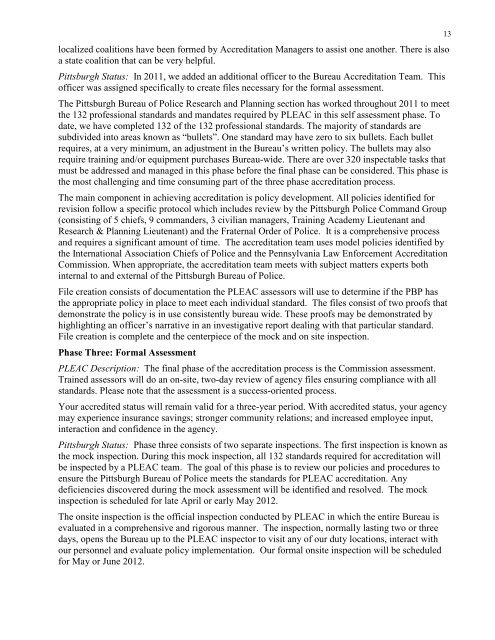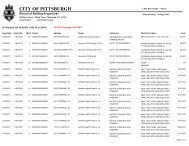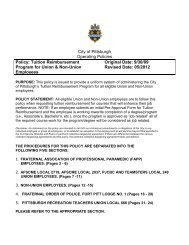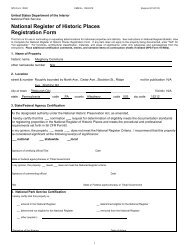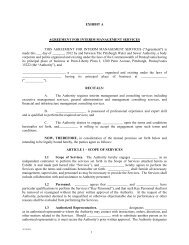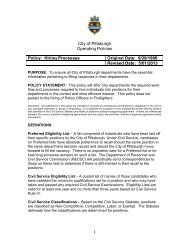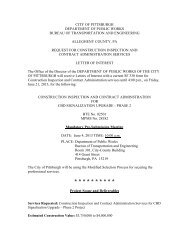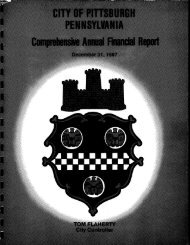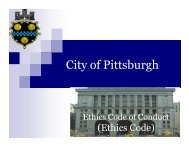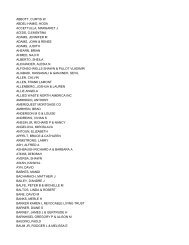2011 Annual Report final - City of Pittsburgh
2011 Annual Report final - City of Pittsburgh
2011 Annual Report final - City of Pittsburgh
Create successful ePaper yourself
Turn your PDF publications into a flip-book with our unique Google optimized e-Paper software.
localized coalitions have been formed by Accreditation Managers to assist one another. There is alsoa state coalition that can be very helpful.<strong>Pittsburgh</strong> Status: In <strong>2011</strong>, we added an additional <strong>of</strong>ficer to the Bureau Accreditation Team. This<strong>of</strong>ficer was assigned specifically to create files necessary for the formal assessment.The <strong>Pittsburgh</strong> Bureau <strong>of</strong> Police Research and Planning section has worked throughout <strong>2011</strong> to meetthe 132 pr<strong>of</strong>essional standards and mandates required by PLEAC in this self assessment phase. Todate, we have completed 132 <strong>of</strong> the 132 pr<strong>of</strong>essional standards. The majority <strong>of</strong> standards aresubdivided into areas known as “bullets”. One standard may have zero to six bullets. Each bulletrequires, at a very minimum, an adjustment in the Bureau’s written policy. The bullets may alsorequire training and/or equipment purchases Bureau-wide. There are over 320 inspectable tasks thatmust be addressed and managed in this phase before the <strong>final</strong> phase can be considered. This phase isthe most challenging and time consuming part <strong>of</strong> the three phase accreditation process.The main component in achieving accreditation is policy development. All policies identified forrevision follow a specific protocol which includes review by the <strong>Pittsburgh</strong> Police Command Group(consisting <strong>of</strong> 5 chiefs, 9 commanders, 3 civilian managers, Training Academy Lieutenant andResearch & Planning Lieutenant) and the Fraternal Order <strong>of</strong> Police. It is a comprehensive processand requires a significant amount <strong>of</strong> time. The accreditation team uses model policies identified bythe International Association Chiefs <strong>of</strong> Police and the Pennsylvania Law Enforcement AccreditationCommission. When appropriate, the accreditation team meets with subject matters experts bothinternal to and external <strong>of</strong> the <strong>Pittsburgh</strong> Bureau <strong>of</strong> Police.File creation consists <strong>of</strong> documentation the PLEAC assessors will use to determine if the PBP hasthe appropriate policy in place to meet each individual standard. The files consist <strong>of</strong> two pro<strong>of</strong>s thatdemonstrate the policy is in use consistently bureau wide. These pro<strong>of</strong>s may be demonstrated byhighlighting an <strong>of</strong>ficer’s narrative in an investigative report dealing with that particular standard.File creation is complete and the centerpiece <strong>of</strong> the mock and on site inspection.Phase Three: Formal AssessmentPLEAC Description: The <strong>final</strong> phase <strong>of</strong> the accreditation process is the Commission assessment.Trained assessors will do an on-site, two-day review <strong>of</strong> agency files ensuring compliance with allstandards. Please note that the assessment is a success-oriented process.Your accredited status will remain valid for a three-year period. With accredited status, your agencymay experience insurance savings; stronger community relations; and increased employee input,interaction and confidence in the agency.<strong>Pittsburgh</strong> Status: Phase three consists <strong>of</strong> two separate inspections. The first inspection is known asthe mock inspection. During this mock inspection, all 132 standards required for accreditation willbe inspected by a PLEAC team. The goal <strong>of</strong> this phase is to review our policies and procedures toensure the <strong>Pittsburgh</strong> Bureau <strong>of</strong> Police meets the standards for PLEAC accreditation. Anydeficiencies discovered during the mock assessment will be identified and resolved. The mockinspection is scheduled for late April or early May 2012.The onsite inspection is the <strong>of</strong>ficial inspection conducted by PLEAC in which the entire Bureau isevaluated in a comprehensive and rigorous manner. The inspection, normally lasting two or threedays, opens the Bureau up to the PLEAC inspector to visit any <strong>of</strong> our duty locations, interact withour personnel and evaluate policy implementation. Our formal onsite inspection will be scheduledfor May or June 2012.13


